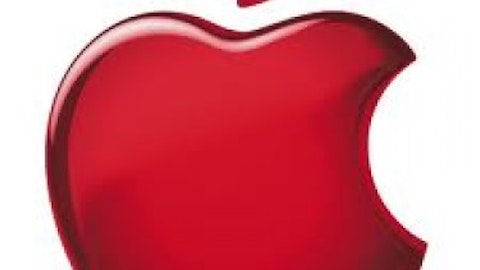Revenue and net income have similarly skyrocketed during Cook’s tenure, as a testament that he can indeed put up results where it counts.

Source: SEC filings. Calendar quarters shown.
Last quarter was quite literally the strongest quarter Apple has ever posted in terms of revenue, net income, and unit volumes for the iPhone and iPad, even if it wasn’t enough for investors.
Scrooge McCook
Other critics have cited Cook’s seemingly hesitant attitude toward increasing Apple’s dividend as a reason he has to go. Apple’s cash hoard continues to swell and Cook continues to give little more than vague assurances that Apple is in “very active” talks about cash options.
It’s entirely true that Apple needs to give more back to improve its capital allocation policies, but remember that Cook is the only reason why investors are getting a dividend in the first place. It was very clear that Jobs was quite content with growing Apple’s cash position to infinity, and had no interest whatsoever in returning cash to shareholders.
In the grand scheme of things, Apple’s current dividend has been in place for less than a year, and most companies tend to stick to an annual dividend cycle. Apple’s being held to a different standard due to its declining share price and soaring cash position. Under other circumstances, investors would have more patience while they await the inevitable dividend boost announcement.
Cook thinks different
If investors were truly this disappointed with Cook, they wouldn’t have given him a 99.1% investor approval rating at Apple’s annual meeting in February. There have been no official developments in the past two months (even as the Apple rumor mill does its daily thing), so there’s no reason for investor approval to change much from then.
None of the above comparisons to Steve Jobs are intended to suggest Cook is better than Jobs overall as a CEO; Cook is just different. Rather, investors need to refocus on the company’s fundamentals over the share price when assessing CEO quality. In those aspects, Cook has performed admirably.
It’s not Cook’s fault that there’s been a distinct disconnect between Apple’s share price and Apple’s fundamentals, since its prices are entirely dominated by emotion in the current environment. There are some legitimate headwinds that Apple faces in its core businesses, but those challenges hardly warrant a nearly $300 billion loss in market cap.
Instead of blaming Cook for Apple’s fall, investors should blame their fellow investors for losing confidence in a company at the top of its game.
The article Don’t Blame Tim Cook for Apple’s Fall originally appeared on Fool.com.
Fool contributor Evan Niu, CFA, owns shares of Apple. The Motley Fool recommends Apple and Netflix. The Motley Fool owns shares of Apple and Netflix.
Copyright © 1995 – 2013 The Motley Fool, LLC. All rights reserved. The Motley Fool has a disclosure policy.




